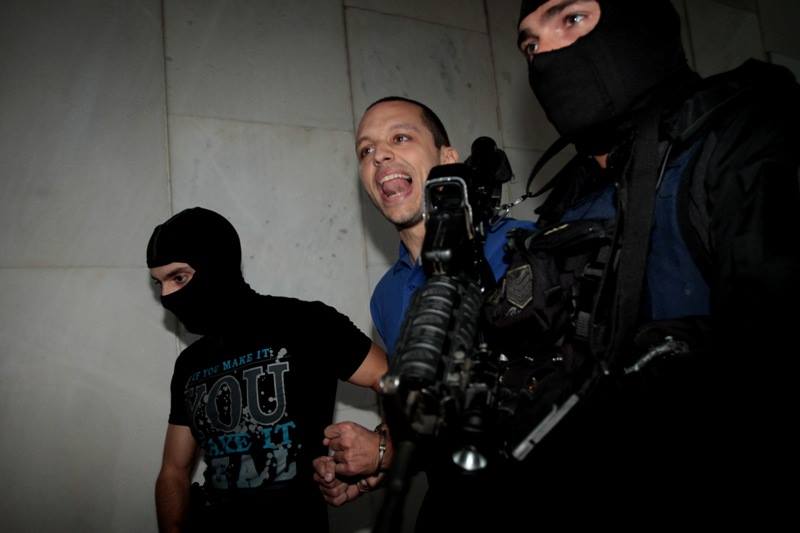Golden Dawn leader arrested in dubious crackdown
- September 28, 2013
Fascism & Far Right
Greek state cracks down on neo-Nazi movement, but questions remain about how willing and able it truly is to stamp out the fascist threat it created.
- Author
It’s quite incredible what difference two weeks can make. Just 10 days ago, government officials and members of Greece’s ruling centrist coalition were openly discussing the possibilities of a future government with the outspokenly neo-Nazi Golden Dawn party. Then, a group of Golden Dawn thugs shamelessly murdered antifascist rapper Pavlos Fyssas, and suddenly everything seemed to change. As tens of thousands of antifascist protesters took to the streets, government officials and mainstream media for the first time openly denounced the party as a “criminal organization”. Investigations were launched, senior police officers suspended and Golden Dawn collapsed in the polls.
Today, the sudden state crackdown on the violent extremists took a dramatic turn with the arrest of the party’s undisputed leader, Nikolaos Michaloliakos, by the national anti-terrorism unit. Three other MPs, a party leader from the Athenian suburb of Nikaia and 12 more party members were also arrested, while further arrest warrants have been issued for several MPs and party members. In an indication of the government’s resolve to finally sweep away the institutional basis of the neo-Nazi movement, today’s crackdown marks the first time since the fall of the military junta in 1974 that sitting MPs — let alone an official party leader — have been arrested.
 Unfortunately, the institutional crackdown and criminal charges are long overdue, as the government (with Europe’s blessing) willingly tolerated the proliferation of neo-Nazi violence against immigrants and leftists for years. There are thus good reasons to remain profoundly skeptical of the government’s actual intentions and the broader implications of the arrests for the future of the antifascist struggle. While arresting its leaders will undoubtedly cripple Golden Dawn’s hierarchical organization and may temporarily paralyze the party’s official actions, it does not eradicate the penetration of fascism into the very fabric of the Greek state and society. Most importantly, a very large amount of Greek police officers and key elements of the country’s armed forces still support and adhere to Golden Dawn’s violent and openly racist ideology.
Unfortunately, the institutional crackdown and criminal charges are long overdue, as the government (with Europe’s blessing) willingly tolerated the proliferation of neo-Nazi violence against immigrants and leftists for years. There are thus good reasons to remain profoundly skeptical of the government’s actual intentions and the broader implications of the arrests for the future of the antifascist struggle. While arresting its leaders will undoubtedly cripple Golden Dawn’s hierarchical organization and may temporarily paralyze the party’s official actions, it does not eradicate the penetration of fascism into the very fabric of the Greek state and society. Most importantly, a very large amount of Greek police officers and key elements of the country’s armed forces still support and adhere to Golden Dawn’s violent and openly racist ideology.
This fact was underlined when, just a few days ago, a group of special force reservists publicly demanded the government to resign and openly called for a military coup should it fail to do so. Since Golden Dawn claims up to 60 percent support from the country’s police force, and since most of its MPs and thugs have so far escaped imprisonment thanks to the right-wing inclinations of the judicial system, it is also unclear how effective the legal crackdown can really be. The current charges may set in motion the criminalization of the party, but it remains unclear how far state institutions are really willing and able to go in their efforts to stamp out the specter of neo-fascism.
These institutional limitations are compounded by the fact that Golden Dawn has traditionally been supported by a powerful sub-section of Greece’s oligarchic capitalist elite, whose financial interests have been neatly served by Golden Dawn’s anti-immigrant narrative and its violent attacks on anarchist and communist organizers. Already a while back, investigations by the Financial Crimes Unit revealed that Golden Dawn is funded by a group of wealthy businessmen, shipowners and orthodox priests (the latter are among the richest landowners in Greece). These are the same people who control the Greek government and media, and the same who are likely to be pulling the strings behind the “sacrificial” moves currently being taken against Golden Dawn.
 So why did these corporate and political elites suddenly swing their weight against the neo-Nazi party that they previously turned a blind eye to, or even actively supported? Basically, the Greek elite always had only two diametrically opposed options to stay in power: either it tried to co-opt Golden Dawn by coaxing its leadership into “politics as usual”, or it repressed the party in an attempt to steal back its voters. The coldblooded murder of Pavlos — which appears to have been ordered by the party leader himself — and the powerful popular backlash this triggered, simply made the former position untenable. And so the elite shifted its strategy 180 degrees and dumped the neo-Nazi group that had previously been so beneficial to its interests.
So why did these corporate and political elites suddenly swing their weight against the neo-Nazi party that they previously turned a blind eye to, or even actively supported? Basically, the Greek elite always had only two diametrically opposed options to stay in power: either it tried to co-opt Golden Dawn by coaxing its leadership into “politics as usual”, or it repressed the party in an attempt to steal back its voters. The coldblooded murder of Pavlos — which appears to have been ordered by the party leader himself — and the powerful popular backlash this triggered, simply made the former position untenable. And so the elite shifted its strategy 180 degrees and dumped the neo-Nazi group that had previously been so beneficial to its interests.
For this reason, it remains crucial to remember that Golden Dawn is far from the only expression of fascism roiling Greek society today. As I argued in a previous piece, Greece’s centrist parties have been setting the political parameters of fascist policymaking for decades, and many current and former government ministers have openly expressed their support for the fascist cause. In a tough interview on BBC Hardtalk yesterday, health minister Adonis Georgidadis was faced with some difficult questions about his own political past as a member of the ultra-nationalist LAOS party, whose leader is widely known for his raging anti-Semitic and anti-immigrant tirades. Former PASOK health minister Andreas Loverdos once referred to Golden Dawn as the country’s “first authentic movement born after the dictatorship”.
In this sense, we should also not forget that as recently as two weeks ago, the political elite and the entire spectrum of the corporate-controlled media was still openly flirting with the idea of a future ruling coalition involving “a more serious” Golden Dawn. Earlier this year, Panagiotis Psomiadis, a leading figure in the ruling New Democracy party, openly exclaimed that “New Democracy and Golden Dawn are sister parties.” And just this week, Nikos Dendias — the minister of public order who claimed to have been “appalled” by the neo-Nazi murder of Pavlos Fyssas — ordered riot police to violently crack down on a largely peaceful demonstration of 50.000 antifascist protesters, preventing the march from reaching the Golden Dawn headquarters and thereby protecting the party from a legitimate expression of popular outrage.
Finally, we should not forget the historical lessons of Nazism in Germany. Adolf Hitler was also arrested by the representatives of the Weimar Republic in 1924, before being appointed Chancellor by that same political elite in 1933. Hitler used his time in prison to organize his movement and dictate the first volume of Mein Kampf. As the capitalist state crumbled around the walls of his cell, Nazi pogroms continued even as the official party leadership was imprisoned. If Greece is to prevent a similar scenario, a lot more will be needed than the arrest of Golden Dawn leaders alone. To truly defeat this disease, fascism must be fought at its very roots in the capitalist state that spawned it.
Source URL — https://roarmag.org/essays/golden-dawn-party-leader-arrested/

